The babies born 18 weeks early – and surviving
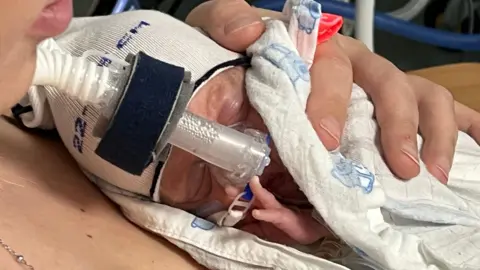 BBC
BBCFor babies born 18 weeks early, life is on a knife edge. But at one neonatal intensive care unit (NICU), the survival rate is "incredibly high".
The centre in Hull is one of the best in England for caring for the sickest and most premature babies, staff say. All five of those born at 22 weeks over the past 18 months have survived.
Among them is Zachary, who arrived weighing just 520 grams (1.1lb).
"We were incredibly frightened," says his mother Lauren. "We weren't sure whether he would survive."
Zachary was born in Doncaster Royal Infirmary at 22 weeks and six days, before being rushed to Hull.
"He had steroids to help his lungs, as he's had great difficulty with his breathing," says Lauren.
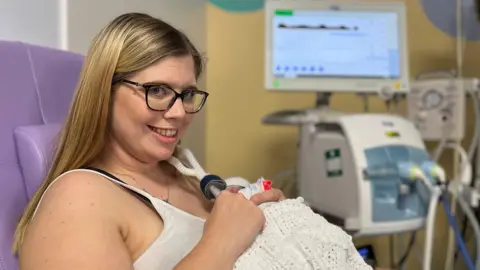
"He's had nitric acid, they've had concerns over his bowels. He's got a double hernia that he'll need an operation for, he's had blood transfusions."
The NICU, a level three unit, is one of only four in the Yorkshire and the Humber region able to look after babies born so early.
Last year, it received £1.3m to buy five more intensive care and high dependency cots, along with new facilities for parents and siblings. It can can now care for 29 babies at any time.
According to the 2023 National Neonatal Audit Programme, it has the lowest regional mortality rates for a unit of its kind.
"The chances of survival for a baby of 22 weeks gestation is incredibly low," says Francesca Matthews, a neonatal matron.
"However, we have all the technology and equipment to be able to care for those babies and our survival and success rate is incredibly high."
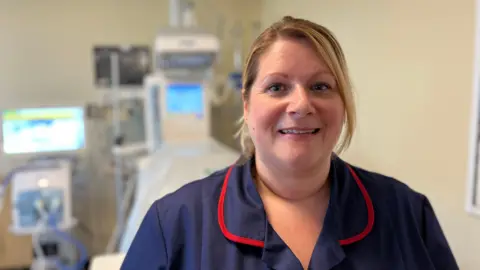
The new facilities – paid for with a £1.2m grant from NHS England and £100,000 from the hospital's WISHH charity – include a sibling play area, a parent lounge and a sensory room, where parents and physiotherapists can take older babies.
Francesca says: "We've worked really, really hard, especially over the past 12 months, to make it a real family affair."
The improvements have been a godsend for Lauren's five-year-old daughter, who loves to visit at weekends and use the play area.
"It's not what she expected being a big sister to be, but she loves coming and getting involved," Lauren says. "She can go and colour and play.
"She knows where all the books are to go to get a story to read to him. It's such a relief having that here."
Having a parents' lounge to escape to for "as many cups of tea as you want" has been a lifeline for Tony, who describes his introduction to fatherhood as "parenting with a bang."
His son Elliot arrived at just 27 weeks gestation. He was not due until the end of December, but Tony is hopeful the little boy will be home in time for Christmas.
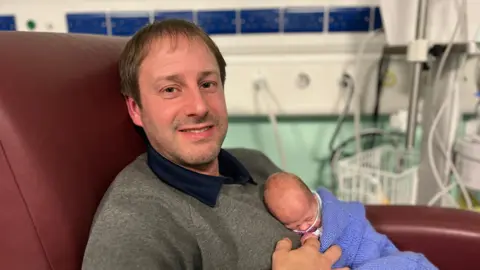
The unit's staff have involved him with Elliot's care as much as possible, he says.
"The emotional stress has been tiring, but I've been involved, supporting mum, supporting Elliot. Walking the dog, doing the washing, doing the shopping."
"You feel comfortable that [Elliot's] in safe hands.
"Here he is six weeks later, growing and looking healthy. He's definitely fighting. All the babies on here are fighting."
Since the NICU expanded, it is increasingly looking after premature and sick babies born at hospitals in Grimsby and Scunthorpe, who need high levels of neonatal care.
Historically, the babies would have been sent to Sheffield Children's Hospital, a three-hour round trip from Grimsby, so the change is a big benefit to parents living in northern Lincolnshire.
They include Mabel, who is returning to the Diana, Princess of Wales Hospital, in Grimsby, after 101 days in the Hull NICU.
She was born at 22 weeks and five days, so she still has another three weeks to wait until her original due date.
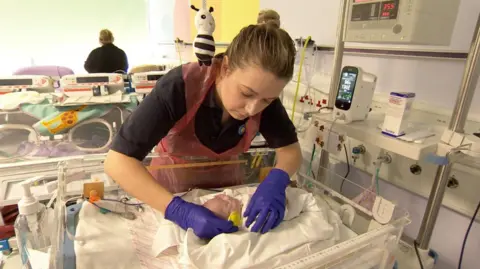
Mabel is prepared for the journey back to her home town by Embrace, a specialist neonatal transfer service.
Staff attach tiny ear defenders and carefully surround her with thick foam blocks to protect her.
Zachary's mother Lauren comes to wave goodbye as Mabel is wheeled out of the unit.
Her recovery is an inspiration to others, says matron Francesca.
"For Lauren to see that even though the chance of survival at 22 weeks isn't always high, babies are going home and are surviving, I think that's a really lovely thing for a family to see," she adds.
Lauren takes a photo as Mabel leaves the unit for the final time. She is growing more confident that Zachary could soon follow suit.
"It's definitely been scary. There's been moments where they have said it's been on a knife edge and we weren't sure what the next hour or the next day would be like," she says. "But we're here 10 weeks later."
If you have been affected by any of the issues raised in this article, help is available from the BBC's Action Line.
Listen to highlights from Hull and East Yorkshire on BBC Sounds, watch the latest episode of Look North or tell us about a story you think we should be covering here.
